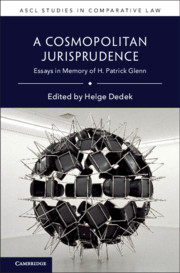Book contents
- A Cosmopolitan Jurisprudence
- ASCL Studies in Comparative Law
- A Cosmopolitan Jurisprudence
- Copyright page
- Epigraph
- Contents
- Foreword
- Acknowledgements
- Notes on Contributors
- Images
- Introduction
- Part I The Tradition of Comparative Law
- 1 How to Do Comparative Law: Some Lessons to Be Learned
- 2 The ‘Comparative Method’ at the Roots of Comparative Law
- 3 The Value of Micro-Comparison
- 4 Sociocultural Challenges for Comparative Legal Studies in Mixed Legal Systems
- 5 Breaking Barriers in Comparative Law
- Part II The Concept of Tradition
- Part III Crossing Boundaries
- H Patrick Glenn Publications
- Index
4 - Sociocultural Challenges for Comparative Legal Studies in Mixed Legal Systems
from Part I - The Tradition of Comparative Law
Published online by Cambridge University Press: 10 December 2021
- A Cosmopolitan Jurisprudence
- ASCL Studies in Comparative Law
- A Cosmopolitan Jurisprudence
- Copyright page
- Epigraph
- Contents
- Foreword
- Acknowledgements
- Notes on Contributors
- Images
- Introduction
- Part I The Tradition of Comparative Law
- 1 How to Do Comparative Law: Some Lessons to Be Learned
- 2 The ‘Comparative Method’ at the Roots of Comparative Law
- 3 The Value of Micro-Comparison
- 4 Sociocultural Challenges for Comparative Legal Studies in Mixed Legal Systems
- 5 Breaking Barriers in Comparative Law
- Part II The Concept of Tradition
- Part III Crossing Boundaries
- H Patrick Glenn Publications
- Index
Summary
H. Patrick Glenn defined common law as dynamic and in relation to other laws. This chapter argues that, looking beyond rules, substance, and structure, towards legal tradition and legal culture, what becomes obvious is the interrelationships between legal systems. Constant contact between legal traditions results in the birth of mixed legal systems, dual systems, hybrids or composites, and legal pluralisms. First, it acknowledges the merits of the functional approach in certain contexts, but also points out the limitations of this approach when faced with dissimilar factual circumstances. Next, it argues that comparative lawyers must use the new approaches added to the methodologies of comparative law, including deep-level comparative research, critical comparative research, sociolegal methodology, and global comparative law. Indeed, “Deep-level comparative law” can reveal irreconcilable differences between legal systems. Finally, Turkey is taken as an example where the law cannot be defined as a mixed jurisdiction in the classical sense. Instead, its hybridity created by its unique historical and socio-cultural context reveals it as mixed in two different senses. The task of teasing out this type of culture, with divided identities, multidimensional, and a composite or hybrid, will not fall to comparatists alone but require help from anthropologists and sociologists.
Keywords
- Type
- Chapter
- Information
- A Cosmopolitan JurisprudenceEssays in Memory of H. Patrick Glenn, pp. 83 - 96Publisher: Cambridge University PressPrint publication year: 2021



